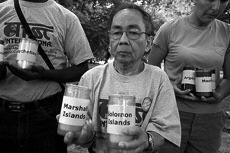Torture victim shares story of experience

Orlando “Dong” Tizon, pictured above at “Torture: Where is the Outrage,” on June 26, 2005 will speak about his prison experience in the Philippines and the Marcos regime Thursday at 7 p.m. at the Illinois Disciples Foundation, 610 E. Springfield Ave. Rick Wiltfong
Apr 20, 2006
Last updated on May 12, 2016 at 02:42 a.m.
Orlando “Dong” Tizon thought he was going to be executed, as he stood blindfolded with his hands cuffed behind his back. When the shots were fired, he fell to the ground, but he was not hurt. His prison guards just picked him up and resumed interrogating him.
“You’re completely in their power – they can do anything they want with you,” he said. “They tell you they’re going to kill you, and they can do it. They did it to some, bodies being thrown out and people just disappearing were very common.”
Now a Filipino activist in his 60s, Tizon will speak about his prison experience in the Philippines and the Marcos regime Thursday at 7 p.m. at the Illinois Disciples Foundation, 610 E. Springfield Ave.
Tizon was arrested in Davao City, Philippines, in 1982 when he was accused of being subversive because of his work with farmers, fishermen and youth to educate them about their rights. Under the Marcos regime, any organization that questioned the dictatorship was considered a rebellion, he said.
Get The Daily Illini in your inbox!
“When you work with poor people and people in rural areas, you become a suspect and accused of inciting a rebellion against the government because the poor were the most dissatisfied and badly hurt by the Marcos government,” he said.
Tizon is currently the assistant director of the Torture Abolition Survivors Support Committee and has a doctorate in sociology. He helps torture survivors who have been through experiences similar to his own.
“I relate to them as someone who has survived torture,” Tizon said. “Torture is one of those things you can’t understand secondhand.”
Tizon said it’s difficult to relate intimately on a deeper level with other people. He has never been married.
“It’s one of the long-standing effects of torture on a person – you do not trust other people,” he said. “. It’s difficult for you to develop a deeper level of a relationship”
Another effect of torture, he said, was having questions about religion and faith. Tizon had been a Catholic priest since before his arrest in 1982, but he said he no longer practices his priesthood duties since he came to the U.S. after his release in April 1986 when the Marcos regime collapsed.
“One of the effects of torture for some people is that you question if there is justice in the world, and what kind of God there is to allow that to happen,” he said. “Our mission is to stop torture. Torture is a difficult and distant nightmare, but we want to educate people. Let them realize this is real and a plague that will destroy humanity.”
“Breaking the Silence of Torture: Survivor and Activist Dong Tizon Speaks Out” is sponsored by the Illinois Disciples Foundation and 12 other co-sponsors including McKinley Foundation, Philippine Student Association and U-C Friends Peace and Service Committee. The event is free and open to the public.
“This is to educate people about the issue and effects of torture and to examine what effect it has on society,” said Jen Tayabji, executive director of the Illinois Disciples Foundation.
Tayabji, University alumna who heard him speak in 2000, said she was very moved by his story.
“It’s moving to hear firsthand than to read about it – you’re looking at someone, and they’re telling you their story,” she said.





